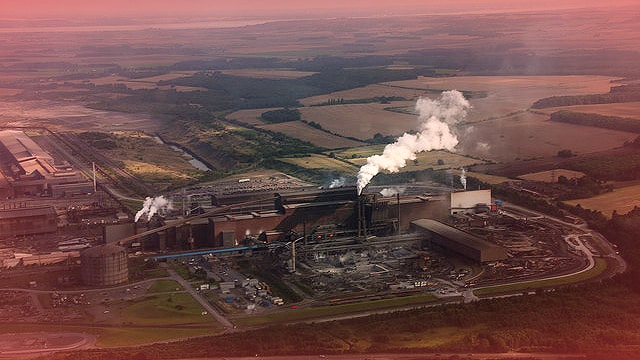

By Andy Yorke
Steel is in trouble again. British Steel has gone into administration while the Tories, refusing to nationalise the firm, are desperately searching for a buyer. The workforce – 4,500 workers spread over two sites, the bulk at the giant Scunthorpe plant – face an uncertain future, with knock-on losses of up to 20,000 local jobs. Unless the plant is nationalised, workers will doubtless face demands for cuts to their jobs and conditions – or the sack.
Labour has rightly called for nationalisation, as has the Unite, GMB and Community unions, but the workers need to take action quickly to prevent any asset stripping, block the closure and pile on the pressure for nationalisation.
Labour should spearhead a massive solidarity movement that could not only help the steelworkers win but politically destabilise Tory attempts to keep their grip on power under a new, hard right leader.
More Brexit fallout
It is widely recognised that without support of some kind, this will only be the latest crisis in the steel industry’s long decline, caused by low investment and productivity in steel since its privatisation in 1988, but more fundamentally a global glut of steel due to overproduction and the post-2008 stagnant world economy.
Global steelmaker SSI shut the big Redcar plant in 2015, while Tata cut workers’ jobs, pay and pensions before selling its operations for £1 to vulture fund Greybull Capital, who then renamed it British Steel, in 2016. Liberty House, mooted as a potential “rescuer” of Scunthorpe, also chopped 270 jobs after buying up Tata’s Scottish plants. Overall 7,000 jobs, nearly one out of five steel workers, disappeared in the 2016 crisis.
But then came the Brexit referendum and Trump’s victory in the US. The endless Brexit uncertainty led to an exodus of EU customers – 70 per cent of British Steel’s base – and drove down the pound, so the price of imported iron ore rose.
Trump’s escalating trade war with China has spilled over to the EU, with the US hiking tariffs against EU steel. Then the EU reciprocated with quotas for steel imports to be followed by a 25 per cent tariff. Britain will be outside all these tariff walls if it crashes out of the EU.
Vulture capitalism
There is a twist in the British Steel saga that shows what a swindle government support for private buyers in these cases is.
Greybull bought British Steel for a song via a parent company based in the Jersey offshore tax haven. Greybull makes its money by buying up “distressed” firms, squeezing them for value, and then selling them on – or not. It made a cool £10 million from buying up then collapsing Monarch Airlines.
British Steel is simply the next victim, with Greybull charging it fat management fees and lending it £50 million at exorbitant interest rates – despite the fact it “owned” BS. And Greybull will be near the front of the line to recoup its money in the liquidation process – tax-free, because it’s registered in Jersey. Notwithstanding this scam, Greybull has repeatedly gone cap in hand to the government for low-interest loans, like £120 million it received to cover its EU carbon emissions bill this year.
Workers should put no faith in the search for another private investor. It didn’t work in 2016. It won’t work now.
Steel in a capitalist world
Labour and the unions need to stop sitting on the sidelines, waiting for a buyer; with Brexit hanging over the sector there may be none. Even if the Tories are forced to nationalise it, it will be a state capitalist intervention, like at RBS, leading to massive job cuts, wage and pension givebacks, and hiked exploitation.
Dr Richard Curry, a steel expert at Swansea University, has warned: “Like most steel plants in the UK, the assets were tired and needed regeneration. Its Eighties and Nineties technology competing with the most modern in the world… buyers won’t accept steel unless it is carbon neutral. British Steel needs a buyer willing to spend, but is ready to accept a 20 or 30-year return. Is there anyone like that in the capitalist world?”
The short answer is, no.
Brexit means breakdown
The only solution to British Steel is for it to be nationalised, under workers’ control, where it can be transformed to become carbon-neutral, and to fight for a continental, democratic plan of production as part of a socialist Europe. If that means defying EU – and WTO – rules, so be it.
But that means starting a fight now. The Financial Times warns that the official receiver is likely to wrap up British Steel one way or another in the next month or two. The unions, Unite, GMB and Community, are merely calling on the Tories to pay wages and production costs “until a buyer for this world-class business can be found”.
Instead shop stewards and rank and file workers should call mass meetings and organise an immediate occupation of the plants to keep the furnaces going and prevent administrators or Greybull from stripping the assets out of the company.
Flying pickets should put their case for a national steel strike to workers in other plants, regardless of their ownership, and build the strike from below, while demanding their “leaders” lend them the full support of their union machines.
Such action could force the Tories’ hand to concede British Steel’s nationalisation. What’s more, it could open the way for a struggle across borders to solve the wider steel crisis on a working class basis: nationalisation under workers’ control, without compensation to Greybull and the other venture capitalist owners, and co-ordinated through a socialist plan of production for socially useful, carbon-neutral steel products, not financial greed.